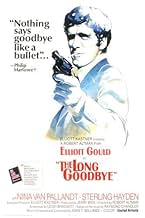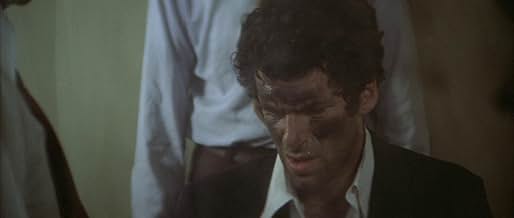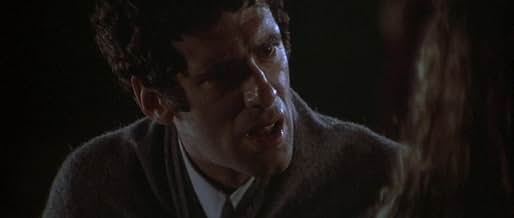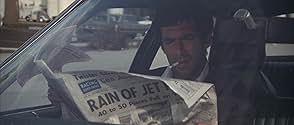निजी जांचकर्ता फिलिप मारलोवे अपने दोस्त को जाम से बाहर निकालने में मदद करता है, लेकिन वहीं पर अपनी पत्नी की हत्या में फंसा दिया जाता है.निजी जांचकर्ता फिलिप मारलोवे अपने दोस्त को जाम से बाहर निकालने में मदद करता है, लेकिन वहीं पर अपनी पत्नी की हत्या में फंसा दिया जाता है.निजी जांचकर्ता फिलिप मारलोवे अपने दोस्त को जाम से बाहर निकालने में मदद करता है, लेकिन वहीं पर अपनी पत्नी की हत्या में फंसा दिया जाता है.
- निर्देशक
- लेखक
- स्टार
- पुरस्कार
- 2 जीत और कुल 1 नामांकन
Stephen Coit
- Detective Farmer
- (as Steve Coit)
Vincent Palmieri
- Vince
- (as Vince Palmieri)
Pancho Córdova
- Doctor
- (as Pancho Cordoba)
फ़ीचर्ड समीक्षाएं
10faraaj-1
It's true. You can't have mixed feelings about The Long Good-bye; you'll either love it or hate it. I started the movie with what I pretended was an open mind, but a secret hope that I'd be fully justified in hating it. In my defense, The Maltese Falcon is my favorite movie and Bogie is my favorite actor. Noir is my favorite film genre and I love Howard Hawk's The Big Sleep wihich had Bogart as the definitive Marlowe.
Altman's take on Chandler's other book with private eye Marlowe, The Long Good-bye, updates the action to the 1970's. He introduces a very 70's theme song and finds as different an actor as he can from Bogart for the role of Marlowe. From the opening frame, Elliot Gould plays Marlowe like a push-over. He's a man who constantly mutters to himself, suffers nervous tics, can't even fool his cat, is afraid of dog's and seems to be the only man not attracted to his sexy hippie neighbors despite their friendliness towards him and obvious promiscuousness.
However, Gould really creates a unique persona with the way he walks, talks, wise-cracks and operates. He becomes a believable person - which is why the uncharacteristic ending is so impacting. The photography, especially the night scenes, are beautifully filmed. The theme music plays everywhere - a Mexican funeral, a doorbell, a car radio etc and with different singers. There are other layers of flesh added to the telling that really work - like the compound security guards impressions of James Stewart, Barbara Stanwyck, Cary Grant and best of all Walter Brennan aka Stumpy from Rio Bravo.
This movie worked great for me and the plot, intricate though it was, was understandable. I will not compare this Marlowe to Bogart's, but do find it admirable that Altman just stuck to the goal of making a good movie without trying to ape or make obvious references to the noir genre.
Altman's take on Chandler's other book with private eye Marlowe, The Long Good-bye, updates the action to the 1970's. He introduces a very 70's theme song and finds as different an actor as he can from Bogart for the role of Marlowe. From the opening frame, Elliot Gould plays Marlowe like a push-over. He's a man who constantly mutters to himself, suffers nervous tics, can't even fool his cat, is afraid of dog's and seems to be the only man not attracted to his sexy hippie neighbors despite their friendliness towards him and obvious promiscuousness.
However, Gould really creates a unique persona with the way he walks, talks, wise-cracks and operates. He becomes a believable person - which is why the uncharacteristic ending is so impacting. The photography, especially the night scenes, are beautifully filmed. The theme music plays everywhere - a Mexican funeral, a doorbell, a car radio etc and with different singers. There are other layers of flesh added to the telling that really work - like the compound security guards impressions of James Stewart, Barbara Stanwyck, Cary Grant and best of all Walter Brennan aka Stumpy from Rio Bravo.
This movie worked great for me and the plot, intricate though it was, was understandable. I will not compare this Marlowe to Bogart's, but do find it admirable that Altman just stuck to the goal of making a good movie without trying to ape or make obvious references to the noir genre.
Private investigator Philip Marlowe is approached by a friend, Terry Lennox, who is in a bit of a jam. Marlowe helps him get to Mexico but the next day his friend's wife turns up dead. The police hold Marlowe but then release him once Terry Lennox is found dead in Mexico - suicide. To the cops it is an open-and-shut case of murder-suicide but Marlowe doesn't believe that to be the case. Marlowe then is hired by the wife of wealthy author Roger Wade to find her husband. The Wades were neighbours of the Lennoxes. A powerful mob boss also leans on him to find the large sum of money Terry Lennox was transporting for him. Could all these events be connected?
Robert Altman directs a movie based on a Raymond Chandler novel, and it's a mixed bag.
Starts off very well with some humorous scenes and dialogue and a fair amount of intrigue. The middle-to-end sections lack focus, however, and, while it is never dull, the movie feels like it is drifting to a lacklustre conclusion. The intrigue just seems to get sucked out of the movie in that segment. In addition, the theme song gets played in just about every situation and in various forms - it gets very irritating, very quickly.
Ends well though, with a good twist and a powerful conclusion.
A new take on Philip Marlowe from Elliott Gould - he is hardly Humphrey Bogart and he's not trying to be. Altman's Philip Marlowe is the dishevelled, anti-social chain-smoking anti-hero rather than the suave, confident hero that Bogart portrayed. For the most part, it works, though at times I wished for the coolness and wise-cracks of Bogie.
Supporting cast are fine. Sterling Hayden is great as the larger-than-life, Ernest Hemingway/John Huston-esque Roger Wade.
Not the Philip Marlowe of the Bogart movies, but it'll do.
Robert Altman directs a movie based on a Raymond Chandler novel, and it's a mixed bag.
Starts off very well with some humorous scenes and dialogue and a fair amount of intrigue. The middle-to-end sections lack focus, however, and, while it is never dull, the movie feels like it is drifting to a lacklustre conclusion. The intrigue just seems to get sucked out of the movie in that segment. In addition, the theme song gets played in just about every situation and in various forms - it gets very irritating, very quickly.
Ends well though, with a good twist and a powerful conclusion.
A new take on Philip Marlowe from Elliott Gould - he is hardly Humphrey Bogart and he's not trying to be. Altman's Philip Marlowe is the dishevelled, anti-social chain-smoking anti-hero rather than the suave, confident hero that Bogart portrayed. For the most part, it works, though at times I wished for the coolness and wise-cracks of Bogie.
Supporting cast are fine. Sterling Hayden is great as the larger-than-life, Ernest Hemingway/John Huston-esque Roger Wade.
Not the Philip Marlowe of the Bogart movies, but it'll do.
I admit, when I first viewed "The Long Goodbye", in 1973, I didn't like the film; the signature Altman touches (rambling storyline, cartoonish characters, dialog that fades in and out) seemed ill-suited to a hard-boiled detective movie, and Elliott Gould as Philip Marlowe? No WAY! Bogie had been perfect, Dick Powell, nearly as good, but "M.A.S.H.'s" 'Trapper John'? Too ethnic, too 'hip', too 'Altman'! Well, seeing it again, nearly 34 years later, I now realize I was totally wrong! The film is brilliant, a carefully-crafted color Noir, with Gould truly remarkable as a man of morals in a period (the 1970s) lacking morality. Perhaps it isn't Raymond Chandler, but I don't think he'd have minded Altman's 'spin', at all! In the first sequence of the film, Marlowe's cat wakes him to be fed; out of cat food, the detective drives to an all-night grocery, only to discover the cat's favorite brand is out of stock, so he attempts to fool the cat, emptying another brand into an empty can of 'her' food. The cat isn't fooled by the deception, however, and runs away, for good...
A simple scene, one I thought was simply Altman quirkiness, in '73...but, in fact, it neatly foreshadows the major theme of the film: betrayal by a friend, and the price. As events unfold, Marlowe would uncover treachery, a multitude of lies, and self-serving, amoral characters attempting to 'fool' him...with his resolution decisive, abrupt, and totally unexpected! The casting is first-rate. Elliott Gould, Altman's only choice as Marlowe, actually works extremely well, BECAUSE he is against 'type'. Mumbling, bemused, a cigarette eternally between his lips, he gives the detective a blue-collar integrity that plays beautifully off the snobbish Malibu 'suspects'. And what an array of characters they are! From a grandiosely 'over-the-top' alcoholic writer (Sterling Hayden, in a role intended for Dan Blocker, who passed away, before filming began), to his sophisticated, long-suffering wife (Nina Van Pallandt), to a thuggish Jewish gangster attempting to be genteel (Mark Rydell), to a smug health guru (Henry Gibson), to Marlowe's cocky childhood buddy (Jim Bouton)...everyone has an agenda, and the detective must plow through all the deception, to uncover the truth.
There are a couple of notable cameos; Arnold Schwarzenegger, in only his second film, displays his massive physique, as a silent, mustached henchman; and David Carradine plays a philosophical cell mate, after Marlowe 'cracks wise' to the cops.
The film was a failure when released; Altman blamed poor marketing, with the studio promoting it as a 'traditional' detective flick, and audiences (including me) expecting a Bogart-like Marlowe. Time has, however, allowed the movie to succeed on it's own merits, and it is, today, considered a classic.
So please give the film a second look...You may discover a new favorite, in an old film!
A simple scene, one I thought was simply Altman quirkiness, in '73...but, in fact, it neatly foreshadows the major theme of the film: betrayal by a friend, and the price. As events unfold, Marlowe would uncover treachery, a multitude of lies, and self-serving, amoral characters attempting to 'fool' him...with his resolution decisive, abrupt, and totally unexpected! The casting is first-rate. Elliott Gould, Altman's only choice as Marlowe, actually works extremely well, BECAUSE he is against 'type'. Mumbling, bemused, a cigarette eternally between his lips, he gives the detective a blue-collar integrity that plays beautifully off the snobbish Malibu 'suspects'. And what an array of characters they are! From a grandiosely 'over-the-top' alcoholic writer (Sterling Hayden, in a role intended for Dan Blocker, who passed away, before filming began), to his sophisticated, long-suffering wife (Nina Van Pallandt), to a thuggish Jewish gangster attempting to be genteel (Mark Rydell), to a smug health guru (Henry Gibson), to Marlowe's cocky childhood buddy (Jim Bouton)...everyone has an agenda, and the detective must plow through all the deception, to uncover the truth.
There are a couple of notable cameos; Arnold Schwarzenegger, in only his second film, displays his massive physique, as a silent, mustached henchman; and David Carradine plays a philosophical cell mate, after Marlowe 'cracks wise' to the cops.
The film was a failure when released; Altman blamed poor marketing, with the studio promoting it as a 'traditional' detective flick, and audiences (including me) expecting a Bogart-like Marlowe. Time has, however, allowed the movie to succeed on it's own merits, and it is, today, considered a classic.
So please give the film a second look...You may discover a new favorite, in an old film!
The very embodiment of '70s Hollywood genre revisionism, Robert Altman's film of The Long Goodbye stands as one of his most accessible, wittily misanthropic films, and probably the finest performance of Elliot Gould's career to date.
A warning for Raymond Chandler purists: you probably won't like this film. Altman and screenwriter Leigh Brackett had quite a task in adapting Chandler's second-last novel to the screen, for in it the 'knight errant' Phillip Marlowe comes over more like a prudish sap. Altman and Brackett have streamlined the narrative, removed peripheral characters, and crucially transformed Marlowe into a murkier, more comically ambiguous protagonist.
In Altman's and Gould's hands, Marlowe is laconically relaxed, murmuring, alternately amused and annoyed at the world. Like Chandler's hero, he is an outsider, a spectator, everywhere he goes. Unlike the literary Marlowe, Gould's character seems washed up on the shores of an unfamiliar land, his nobility as crumpled and stale as his suit.
Along for the ride are the archetypal Chandler villains and victims: self-hating celebrities, young wives trapped in loveless marriages, crooked doctors, low-rent psychopathic gangsters, bored cops, flunkies lost out of time. Typically, the milieux Marlowe moves in range from the affluence of the Malibu Colony to the cells of the County Jail. Altman, however, wishes to make a film in and about 1973; the film is shot through with the psychic reverberations of the end of hippiedom and the remoteness of the 'Me Generation'.
Another Altman touch is his openly expressed contempt for Hollywood and its conventions. As if to acknowledge the artificiality of a private detective story in the midst of 1970s Los Angeles, the film is suffused with jokey references to cinema. Bookended with 'Hooray for Hollywood', the film shows gatekeepers impersonating movie stars, characters changing their names for added class, hoods enacting movie clichés simply because that's where they learnt to behave. Even Marlowe himself refers to the artifice when talking to the cops: 'Is this where I'm supposed to say 'What's all this about?' and he says 'Shut up, I ask the questions' ?'
As for the supporting cast, Sterling Hayden shines out as the beleaguered novelist Roger Wade. There is more than a touch of Hemingway in Hayden's bluff, blustering, vulnerable old hack. Baseball champ and sportscaster Jim Bouton is casually mysterious as Marlowe's friend Terry Lennox, Laugh-In alumnus Henry Gibson is suitably greasy as Dr Verringer, actor/director Mark Rydell (best known for 'On Golden Pond') is convincingly chilling as gangster Marty Augustine, and Nina van Pallandt lends a dignified, defiant pathos to her role as Eileen Wade.
Special note must be made of Vilmos Zsigmond's tremendous photography, employing his early 'flashing' style of exposure to lend Los Angeles a suitably sultry, bleached-out aura. Also deserving attention is John Williams' ingeniously minimalist score. Comprised solely of pseudo-source music, the score is a myriad of variations on a single song, appearing here as supermarket muzak, there as a party singalong, elsewhere as a late night radio tune.
The film's controversial ending is utterly antithetical to Chandler's vision. The message from Altman, however, is loud and clear: Chandler's world no longer exists if indeed it ever did.
A warning for Raymond Chandler purists: you probably won't like this film. Altman and screenwriter Leigh Brackett had quite a task in adapting Chandler's second-last novel to the screen, for in it the 'knight errant' Phillip Marlowe comes over more like a prudish sap. Altman and Brackett have streamlined the narrative, removed peripheral characters, and crucially transformed Marlowe into a murkier, more comically ambiguous protagonist.
In Altman's and Gould's hands, Marlowe is laconically relaxed, murmuring, alternately amused and annoyed at the world. Like Chandler's hero, he is an outsider, a spectator, everywhere he goes. Unlike the literary Marlowe, Gould's character seems washed up on the shores of an unfamiliar land, his nobility as crumpled and stale as his suit.
Along for the ride are the archetypal Chandler villains and victims: self-hating celebrities, young wives trapped in loveless marriages, crooked doctors, low-rent psychopathic gangsters, bored cops, flunkies lost out of time. Typically, the milieux Marlowe moves in range from the affluence of the Malibu Colony to the cells of the County Jail. Altman, however, wishes to make a film in and about 1973; the film is shot through with the psychic reverberations of the end of hippiedom and the remoteness of the 'Me Generation'.
Another Altman touch is his openly expressed contempt for Hollywood and its conventions. As if to acknowledge the artificiality of a private detective story in the midst of 1970s Los Angeles, the film is suffused with jokey references to cinema. Bookended with 'Hooray for Hollywood', the film shows gatekeepers impersonating movie stars, characters changing their names for added class, hoods enacting movie clichés simply because that's where they learnt to behave. Even Marlowe himself refers to the artifice when talking to the cops: 'Is this where I'm supposed to say 'What's all this about?' and he says 'Shut up, I ask the questions' ?'
As for the supporting cast, Sterling Hayden shines out as the beleaguered novelist Roger Wade. There is more than a touch of Hemingway in Hayden's bluff, blustering, vulnerable old hack. Baseball champ and sportscaster Jim Bouton is casually mysterious as Marlowe's friend Terry Lennox, Laugh-In alumnus Henry Gibson is suitably greasy as Dr Verringer, actor/director Mark Rydell (best known for 'On Golden Pond') is convincingly chilling as gangster Marty Augustine, and Nina van Pallandt lends a dignified, defiant pathos to her role as Eileen Wade.
Special note must be made of Vilmos Zsigmond's tremendous photography, employing his early 'flashing' style of exposure to lend Los Angeles a suitably sultry, bleached-out aura. Also deserving attention is John Williams' ingeniously minimalist score. Comprised solely of pseudo-source music, the score is a myriad of variations on a single song, appearing here as supermarket muzak, there as a party singalong, elsewhere as a late night radio tune.
The film's controversial ending is utterly antithetical to Chandler's vision. The message from Altman, however, is loud and clear: Chandler's world no longer exists if indeed it ever did.
The first time I saw this movie was back in the seventies and this was the film that won me over to Robert Altman's great works in the American cinema.
Granted, at the time of the movie's release Raymond Chandler purists naturally didn't appreciate the transformation his knight errant private eye underwent. But nowadays, the viewer must see the film for its great direction, terrific performances, Leigh Brackett's excellent screenplay and the fine cinematography. Not to mention simply the challenge of understanding a truly baffling plot. As in all of Altman's works, this one is peppered with offbeat characters and subtle (and some not-so subtle) situations that positively take you by surprise. As a maverick figure in Hollywood, Altman made sure "iconoclast" was stamped all over this film, it's a true nose-thumbing at every institution that Hollywood reveres; idealistic movie heroes, neat happy-ever-after endings, big budget spectacles, dependable money-making conventions and all around ass-kissing.
But the real treat here is, of course, Elliott Gould, and I don't believe that it's the best thing he's ever done on screen, as many think. He's certainly turned out even better performances than this one throughout the past 3 decades. But yet, in The Long Goodbye, Gould is just so much fun to watch, especially when he's being interrogated by the police or just muttering lines like, "He's got a girl, I got a cat" or "a melon convention" when he gives up trying to get his topless next-door neighbors' attention.
An interesting thing to note at the end of the film - we see the back shot of Marlowe walking away and that to me, was the private eye's closing shot, but then we have a front shot of Elliott Gould who begins playing his harmonica and then continues on up the road doing his little number, dancing a jig, etc. And to me that shows where Marlowe left off and where Gould takes over. So they weren't one and the same after all. Once again, a statement to those who would be too quick to take the Marlowe myth seriously.
The Long Goodbye is vintage Altman, a masterwork to be savoured forever.
Granted, at the time of the movie's release Raymond Chandler purists naturally didn't appreciate the transformation his knight errant private eye underwent. But nowadays, the viewer must see the film for its great direction, terrific performances, Leigh Brackett's excellent screenplay and the fine cinematography. Not to mention simply the challenge of understanding a truly baffling plot. As in all of Altman's works, this one is peppered with offbeat characters and subtle (and some not-so subtle) situations that positively take you by surprise. As a maverick figure in Hollywood, Altman made sure "iconoclast" was stamped all over this film, it's a true nose-thumbing at every institution that Hollywood reveres; idealistic movie heroes, neat happy-ever-after endings, big budget spectacles, dependable money-making conventions and all around ass-kissing.
But the real treat here is, of course, Elliott Gould, and I don't believe that it's the best thing he's ever done on screen, as many think. He's certainly turned out even better performances than this one throughout the past 3 decades. But yet, in The Long Goodbye, Gould is just so much fun to watch, especially when he's being interrogated by the police or just muttering lines like, "He's got a girl, I got a cat" or "a melon convention" when he gives up trying to get his topless next-door neighbors' attention.
An interesting thing to note at the end of the film - we see the back shot of Marlowe walking away and that to me, was the private eye's closing shot, but then we have a front shot of Elliott Gould who begins playing his harmonica and then continues on up the road doing his little number, dancing a jig, etc. And to me that shows where Marlowe left off and where Gould takes over. So they weren't one and the same after all. Once again, a statement to those who would be too quick to take the Marlowe myth seriously.
The Long Goodbye is vintage Altman, a masterwork to be savoured forever.
क्या आपको पता है
- ट्रिवियाThe location for Roger Wade - Sterling Hayden's home was actually Robert Altman's home at the time.
- गूफ़During the scene where Marlowe is chasing Mrs. Wade in her top-down Mercedes 450 SL convertible, the car goes from having head rests to having no head rests in various shots.
- भाव
Philip Marlowe: Nobody cares but me.
Terry Lennox: Well that's you, Marlowe. You'll never learn, you're a born loser.
Philip Marlowe: Yeah, I even lost my cat.
- कनेक्शनEdited into El adios largos (2013)
- साउंडट्रैकThe Long Goodbye
by John Williams and Johnny Mercer
Performed by The Dave Grusin Trio, Jack Sheldon, Clydie King, Jack Riley, Morgan Ames, Aluminum Band, The Tepoztlan Municipal Band
टॉप पसंद
रेटिंग देने के लिए साइन-इन करें और वैयक्तिकृत सुझावों के लिए वॉचलिस्ट करें
विवरण
- रिलीज़ की तारीख़
- कंट्री ऑफ़ ओरिजिन
- भाषाएं
- इस रूप में भी जाना जाता है
- Un largo adiós
- फ़िल्माने की जगहें
- 2178 High Tower Drive, हॉलीवुड, लॉस एंजेल्स, कैलिफोर्निया, संयुक्त राज्य अमेरिका(Marlowe's residence)
- उत्पादन कंपनियां
- IMDbPro पर और कंपनी क्रेडिट देखें
बॉक्स ऑफ़िस
- बजट
- $17,00,000(अनुमानित)
- दुनिया भर में सकल
- $27,504
इस पेज में योगदान दें
किसी बदलाव का सुझाव दें या अनुपलब्ध कॉन्टेंट जोड़ें








































